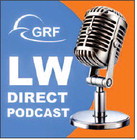All-department town hall attracts hundreds


TOWN HALL
Directors discuss security, bylaws changes and excessive club setups
by Emma DiMaggio
emmad@lwsb.com
Hundreds gathered in Clubhouse 4 on April 19 for an all-department town hall event to get updates on the new gate access system and learn more about club set-up fees, GRF bylaw changes and other topics of interest. People also had a platform to give feedback on GRF operations, which included customer service concerns and traffic safety among other issues.
Excessive club setups could increase cost of custodial contract The Recreation Department has proposed a plan to recoup expenses related to excessive club setups by charging fees to clubs whose setup and teardown times exceed one hour.
According to Recreation Director Jesse Cripps, club setups have become increasingly complicated, some of which require hours-long setup times.
This poses a challenge for Recreation. Third-party custodians are responsible for setting up elaborate table and chair configurations for club meetings and events.
However, Recreation’s custodial contract provides only one custodian per shift, per clubhouse. Excessive set-ups and teardowns often require multiple custodians.
Cripps showed the crowd a few examples to demonstrate how certain setups can strain staffing. The examples are in custodial hours—meaning two custodians working for 30 minutes equals one custodial hour.
In one, a bingo event required 38 long tables, four regular tables and nearly
LW residents listen intently as Security Director Victor Rocha (standing) fields questions from the crowd. 300 chairs. The setup took five hours and 50 minutes, almost six times as long as budgeted. Their typical attendance is under 75.
In another instance, a cultural club required a 2.5-hour setup, and a church required a 4-hour-and-15-minute setup. Approximately 45 people attend regularly. Among all of Recreation’s examples, longer setup times did not correlate with higher attendance levels.
Labor and supplies have also risen with inflation, and the hourly cost per custodian is $27 per hour.
It’s this $27 hourly that Recreation wants to pass on to clubs with lengthy labor-intensive setups that will create cost burden for GRF during future contract negotiations. Its three-year custodial contract has already grown to $6 million.
The department hopes that, in combination with education, the new $27 per hour fee will help discourage excessive setups and recoup the losses associated with them.
Cripps said he hoped the presentation was comforting to most LW clubs who have “perfectly reasonable setups” that custodians can complete in the budgeted time frame.
The new plan also places the cost burden on the exclusive-use group, i.e. the clubs, instead of the whole community, since an increase in the overall custodial budget could affect residents’ assessment fees.
Cripps emphasized that GRF was not attempting to make money from shareholders or put a financial burden on clubs. The move is meant to recoup unexpected costs that fall outside the GRF’s contract.
GRF Director Sandy Geffner clarified that free concerts like Abilene, the Velvetones and Vinyl Rock, which are hosted by Recreation, will not be subject to the fee.
An answer to unanswered phones GRF is tackling the issue of unanswered phone calls. In response to resident complaints, the foundation will form a “customer care concierge team.”
The team will be made up of customer service representatives whose main job will be to answer shareholder questions, and answer phones and direct calls.
One current receptionist has been assigned to the team, and two additional staff members were hired to similar positions— one will work concurrently as a cashier and the other will be a subject matter expert on Stock Transfer.
Also, GRF is getting a new, more “dynamic” phone system in the coming months and rolling out a set of standard operating procedures that will require staff to return voicemails within two business days.
“The hope is that, when everyone does call in, there’s going to be less transfers and more immediate answering of questions for shareholders,” GRF Executive Director Jessica Sedgewick said. “The goal is to not have to send shareholders all over the place trying to get their answers. That is coming; we’re working on it.”
During the town hall, Sedgewick also shared data provided by GRF’s phone company that showed that GRF offices received 149,000 phone calls in March, which equates to about 5,000 calls per weekday.
She pointed out that the sometimes-overwhelming call volume can prove challenging to staff. Of 180 employees, only around 80 take phone calls. Some departments mostly employ staff who are out in the field such as Service Maintenance and Security.
LWers will vote on bylaws changes
Directors discussed two proposed changes to GRF bylaws that will be voted on this coming month.
A “yes” vote would correct language in the bylaws that implies that the annual GRF elections are at large, meaning that a quorum of votes of the entire GRF membership is required, rather than a subset from a specific Mutual. This change would ensure that each Mutual’s GRF representative is selected only by that Mutual’s members.
The second proposal asks GRF members to amend articles implying that only men can be GRF directors or serve as GRF board directors—a rule that led the crowd to erupt with laughter.
“I hear all the women laughing,” Susan Hopewell said at the town hall. “Clearly that’s not the case, because in recent years it’s been more women than it’s been men.”
The bylaws were written in 1962, hence the need for updated language.
Member participation in this election is particularly important, because 2,203 members must return ballots for the bylaw measures to be passed.
For more information on the bylaw changes or the ballot process, call Election Specialist Ripa Barua at 562-431-6586, ext. 329.
New gate access system is on track
Security Director Victor Rocha gave the crowd a brief update on the progress of LW’s new gate access system.
The enhanced access system will increase security at LW’s entrance gates and will include:
• 10 License Plate Readers (LPR) to capture vehicle plates • Three resident entry lanes with “red/green” traffic signals for security officer use.
• Four barrier gates: two at the Main Gate and one each at the North Gate and St. Andrews Gate.
• Three guard station computers/ kiosks at each vehicle entry point (one kiosk at each gate).
• RFID tags for residents, staff and contractors. The tags will be used to electronically identify residents and employees as they enter through any gate.
• Electronic links that can cancel a vehicle’s access in seconds, creating tighter control when residents move out or want to prevent unwanted visitors from entering the community.
The new system will use RFID tags—small stickers that attach to a car’s window shield and contain a microchip that relays information via radio frequencies. In this case, the tags will identify cars that are approved to enter Leisure World.
Security will release an update on the RFID tags in the next month or two, according to Rocha. The update will include information on how to get the tags, how Security is going to pass out the tags and more.
“We have a lot to pass out, and a lot to distribute and get onto vehicles, and that will all be explained in the coming months,” Rocha said, noting that each resident will get one tag.
One feature of the new system will allow residents to add visitors electronically using a web browser.
Residents will also be able to send their visitors a guest pass via text or email. Visitors can print these passes or show Security the pass on their phones to gain access to the community.
One LWer expressed concern that older folks without computer savvy would have a hard time with the newer, more high-tech system.
Rocha emphasized that residents without strong computer skills shouldn’t worry: Security employees will still accept calls and collect visitor names manually, as they do now.
Other Updates
• Speed cushions are coming: In an ongoing effort to elevate traffic safety in LW, the GRF will install speed cushions at St. Andrews Drive, Del Monte Drive, El Dorado Drive, Golden Rain Road and Thunderbird Drive. The cushions have been received, and the job is awaiting approval from the Orange County Fire Authority, at which point installation can begin, according to Senior Director of Facilities Mark Weaver.
• Catalytic engraving program may come to LW: After five catalytic converters were stolen from three Minibuses in on April 3, Security is working with the Seal Beach Police Department to set up a catalytic converter engraving program in Leisure World. Serial number engravings are meant to deter the resale of stolen car parts. More information will be published in the LW Weekly as it becomes available.
• New online payment system: In the next few weeks, residents should expect a welcome letter in the mail discussing the new CINC System. GRF will also have a new lockbox where residents can mail payments. Payments can still be dropped off at the Administration Building. The current lockbox will be open during the transition process. GRF is also ending its program with ClickPay. Any residents who’ve signed up for recurring payments with ClickPay are going to have to transition over to the new CINC system. More information about this transition, as well as about a new resident portal for shareholders, will be included in the welcome letter. Information sessions about these changes are scheduled for May 15-17 in the Learning Center.

Innnovative Cleaning Services custodian Salvador Moreno (l) and supervisor Selvin Deleonhaul fold-out tables for an event in Clubhouse 6.




